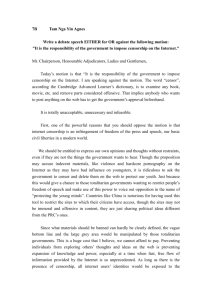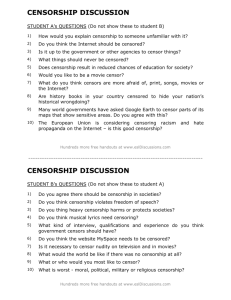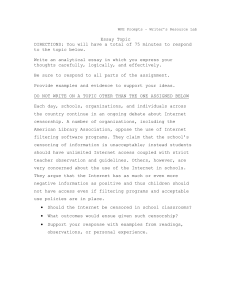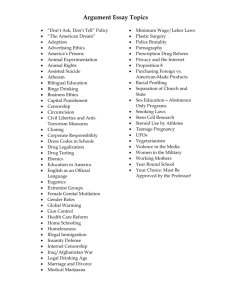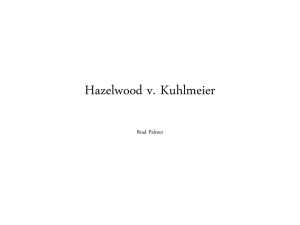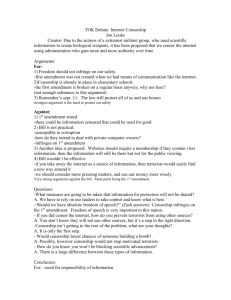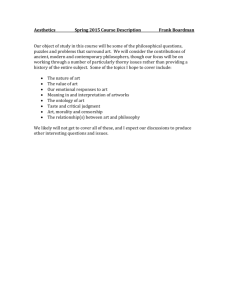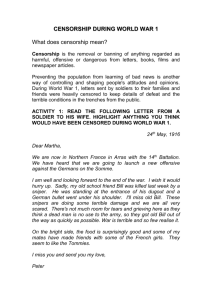Censorship & the Media
advertisement
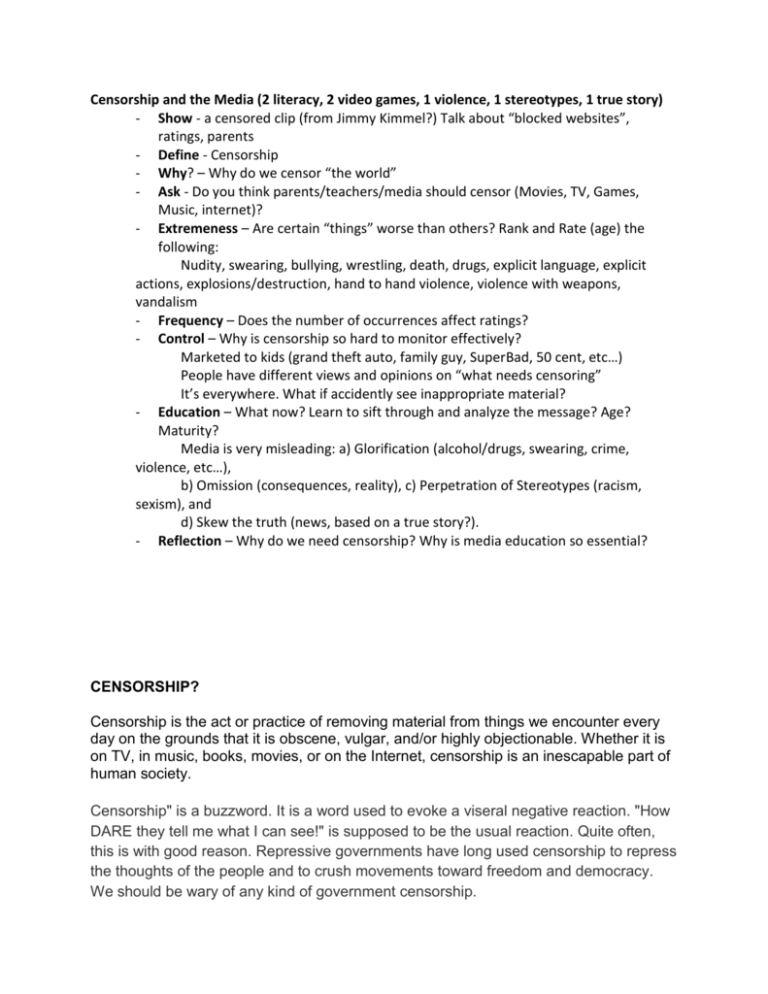
Censorship and the Media (2 literacy, 2 video games, 1 violence, 1 stereotypes, 1 true story) - Show - a censored clip (from Jimmy Kimmel?) Talk about “blocked websites”, ratings, parents - Define - Censorship - Why? – Why do we censor “the world” - Ask - Do you think parents/teachers/media should censor (Movies, TV, Games, Music, internet)? - Extremeness – Are certain “things” worse than others? Rank and Rate (age) the following: Nudity, swearing, bullying, wrestling, death, drugs, explicit language, explicit actions, explosions/destruction, hand to hand violence, violence with weapons, vandalism - Frequency – Does the number of occurrences affect ratings? - Control – Why is censorship so hard to monitor effectively? Marketed to kids (grand theft auto, family guy, SuperBad, 50 cent, etc…) People have different views and opinions on “what needs censoring” It’s everywhere. What if accidently see inappropriate material? - Education – What now? Learn to sift through and analyze the message? Age? Maturity? Media is very misleading: a) Glorification (alcohol/drugs, swearing, crime, violence, etc…), b) Omission (consequences, reality), c) Perpetration of Stereotypes (racism, sexism), and d) Skew the truth (news, based on a true story?). - Reflection – Why do we need censorship? Why is media education so essential? CENSORSHIP? Censorship is the act or practice of removing material from things we encounter every day on the grounds that it is obscene, vulgar, and/or highly objectionable. Whether it is on TV, in music, books, movies, or on the Internet, censorship is an inescapable part of human society. Censorship" is a buzzword. It is a word used to evoke a viseral negative reaction. "How DARE they tell me what I can see!" is supposed to be the usual reaction. Quite often, this is with good reason. Repressive governments have long used censorship to repress the thoughts of the people and to crush movements toward freedom and democracy. We should be wary of any kind of government censorship. But too often, the cry of "censorship" goes out against what is not truly censorship, but simply selectivity, as if having any kind of taste makes us repressive censors. "How dare Wal-Mart not sell Penthouse! That's CENSORSHIP!" is the cry. Sorry, but no it's not. That is a business decision on the part of a private company on what they choose to associate with their corporate name. Wal-Mart is not banning Penthouse, they are simply chosing not to sell it. That is their right. If you want to buy it, you go somewhere else. That is your right. One personal peeve of mine is when artists claim the right to take government money and then have no restrictions in what they create. They just took someone else's money! Of course the people (that is, the taxpayers) have the right to put restrictions on that gift. If you truly believe that artistic freedom is paramount to your creativity, then don't take handouts from the government. Government money is tainted money. The minute you take it, you are under someone else's authority. If you don't like those restrictions, don't take the money. We Need Censorship. It won't kill us to make limits, but it might if we don't. That is why it is JUSTIFIABLE to limit adult's freedom of expression--it is in our, society's, best interests to protect the children. Lional Tate is just one example of a child gone bad because of the media. Tate mimicked his idol the Rock, killing a six-year old girl by smashing her skull, pulverizing her liver, breaking her ribs and causing numerous cuts and bruises. If that's not enough of an example what about the teen from New Jersey who simply listened to Ozzy Osborne's "Suicide Solution" and killed himself? These are not random occurrences, we hear about them on the news frequently. If our freedom of expression is harming kids why can't we fix the problem by not allowing them access to it? People, especially children are very susceptible to being influenced by what they watch or see happen throughout their lives. "Monkey see, Monkey do." Everyone has heard this phrase sometime in his or her life. This phrase is simple, yet very applicable to today's debate. When a child sees someone or something doing something. They will of course follow suit and imitate the action being performed. Children do not know any better. Therefore they are innocent and deserve to be respected. Through television, video games, and movies, children and teens view countless acts of violence, brutality, and terror as part of entertainment. They become conditioned to associating violence with entertainment. First-person shooter video games develop our children's skills in operating weapons. The games reward marksmanship, and further reinforce the association of killing with entertainment. In the past, the heroes of movie and television shows were usually people who strictly followed the law. Now, heroes are often people who take the law into their own hands, who see an injustice or evil and seek to rectify it personally, sometimes brutally, regardless of the consequences. Such portrayals signal, to a child, society's approval of that behavior. Lacking the judgment that comes with age, a child who feels he has been dealt with unfairly may copy that behavior, with disastrous consequences. Each day that goes on and we do not take action, children become more and more desensitized. They become used to the sight of blood and do not mind it. They may reach an extreme point in which they began to believe that violence is okay. Children are very vulnerable. They are prone to imitate what they see and hear. Children do not enjoy the same independence that adults do. They are not allowed to drink, smoke, vote, view inappropriate material, etc... this is because they are still developing, and while they may be quite perceptive and intelligent, they are very susceptible to exterior influences and are generally not capable of mature, independent thought. Children do not see the world through the same filter of experience that adults do. Children see things more literally. They do not possess the sophisticated sensibilities to distinguish fiction from reality. For example, did your mother ever tell you about Santa Clause? Didn't you believe, with absolute conviction, at one point in time that he was real? But now, years later, you and I both know that he is just a fictional story. Argument three, not only do we need to censor television, movies, etc., we also need to limit the easy accessibility of these games to the general public, to protect our society. The Duke Nukem series like Marathon, Descent, Doom, Unreal and Quake are wildly popular games called 'shooters.' Players move through the world behind a weapon learning to kill and destroy people, monsters, tanks, or aircraft without themselves getting killed. If that's not enough what about games like Max Paine and Grand Theft Auto, where you control thefts and killings? These games are life-like and explicit and are available at Toys R Us...that's right a children's store. Can you imagine holding a conviction of equal strength with violence...like since Duke Nukem can kill people so can I....or that because he degrades women so can I? We see these things as outrageous, simply, because we can distinguish between right and wrong, but a child can't. To censor or not to censor, that is the question. Censorship is the act or practice of removing material from things we encounter every day on the grounds that it is obscene, vulgar, and/or highly objectionable. What media do we censor? Books, movies, music, internet, tv, print What content do we censor? Language, violence, nudity, explicit content, info… Who controls censorship? Parents, teachers, companies, government Why do we censor? Protect/hide inappropriate things from children (vulnerable) Brainstorm reasons for and reasons against censorship: FOR AGAINST Are certain “things” worse than others? Rank and Rate (age) the following: Rank Rate (age) Rank Nudity War Swearing Death Bullying Shooting Wrestling Knifing Rate (age) Ultimate Fighting Bombs Drugs Vandalism Explicit Content Horror Destruction Monsters Extreme (jack___) Alcohol Some Issues surrounding “inappropriate content” a) Marketed to kids (grand theft auto, family guy, SuperBad, 50 cent, etc…) b) People have different views and opinions on what’s “inappropriate” c) It’s everywhere. What if one accidentally views inappropriate material? d) Media content is misleading: i) Glorification (alcohol/drugs, swearing, crime, violence, etc…), ii) Omission (consequences, reality), iii) Promotes Stereotypes (racism, sexism), and iv) Skews the truth (news, based on a true story?). What is your opinion on censorship?


